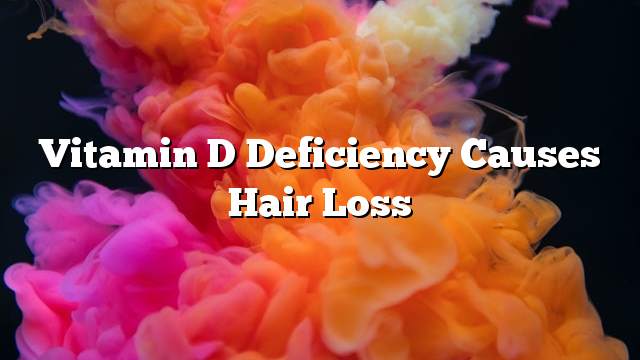Hair loss
Scientists have found several causes for hair loss, including: diabetes, thyroid problems, contraceptive use, anxiety, stress, unhealthy nutrition, low protein diet, or vitamins. The main cause of hair loss is heredity .
Scientists have tried in recent studies to study the relationship between vitamin D deficiency and hair loss, so we will mention during this article information about vitamin D, and show its relationship to hair loss, and recall sources to avoid the lack of the human body.
Vitamin D
Vitamin D, called “vitamin sun” is an important nutrient in the human body, so that the lack of the body has many health problems, including hair loss. Vitamin D is a fat-soluble vitamin that is produced when the sun converts chemical compounds in the skin into a form of vitamin D and then converts the body into active vitamin D.
Vitamin D is divided into five groups: d1, d2, d3, d4, d5. Harvard University Medical School added that exposure to sunlight conservatively maintains vitamin D in the body, keeping hair from falling, but nowadays most of the work My office has reduced the exposure to sunlight, which has reduced vitamin D in the body. To ensure that the vitamin D level in the human body is good, a laboratory test, a simple test for 25-hydroxyvitamin D, is recommended. Vitamin D deficiency is usually diagnosed at a concentration of less than 20 ng / ml.
Vitamin D related to hair loss
The lack of vitamin D in mice has caused a defect in the natural cycle of hair follicles, causing hair loss in several months, As well as to a higher risk of cancer of mice, scientists found at Cairo University that the lower the proportion of vitamin D in the body of women, increased the proportion of hair loss, so vitamin D is very important to prevent hair loss.
Benefits of Vitamin D
- Plays an important and vital role in maintaining human health.
- It has an important role in bone building; it contributes to the absorption of calcium.
- Prevents cardiovascular disease; it contributes to strengthening the body’s immunity.
Sources of Vitamin D
The body needs about 2200 – 3000 IU of vitamin D, and can be obtained from three sources:
- Sun rays : Exposure to the sun before noon of 15 – 20 minutes, the main source and preferred to acquire vitamin D, by exposing the face and the hands and feet and direct sunlight at least twice a week.
- the food : Vitamin D can be obtained from foods such as oily fish such as sardines, salmon and tuna, and can also be obtained from eggs, chicken liver, cabbage, and fortified foods such as milk and juice.
- Nutritional supplements : If you find a severe vitamin D deficiency in the body, it is advisable to consult your doctor and consult him about taking vitamin D supplements to compensate for the deficiency.
